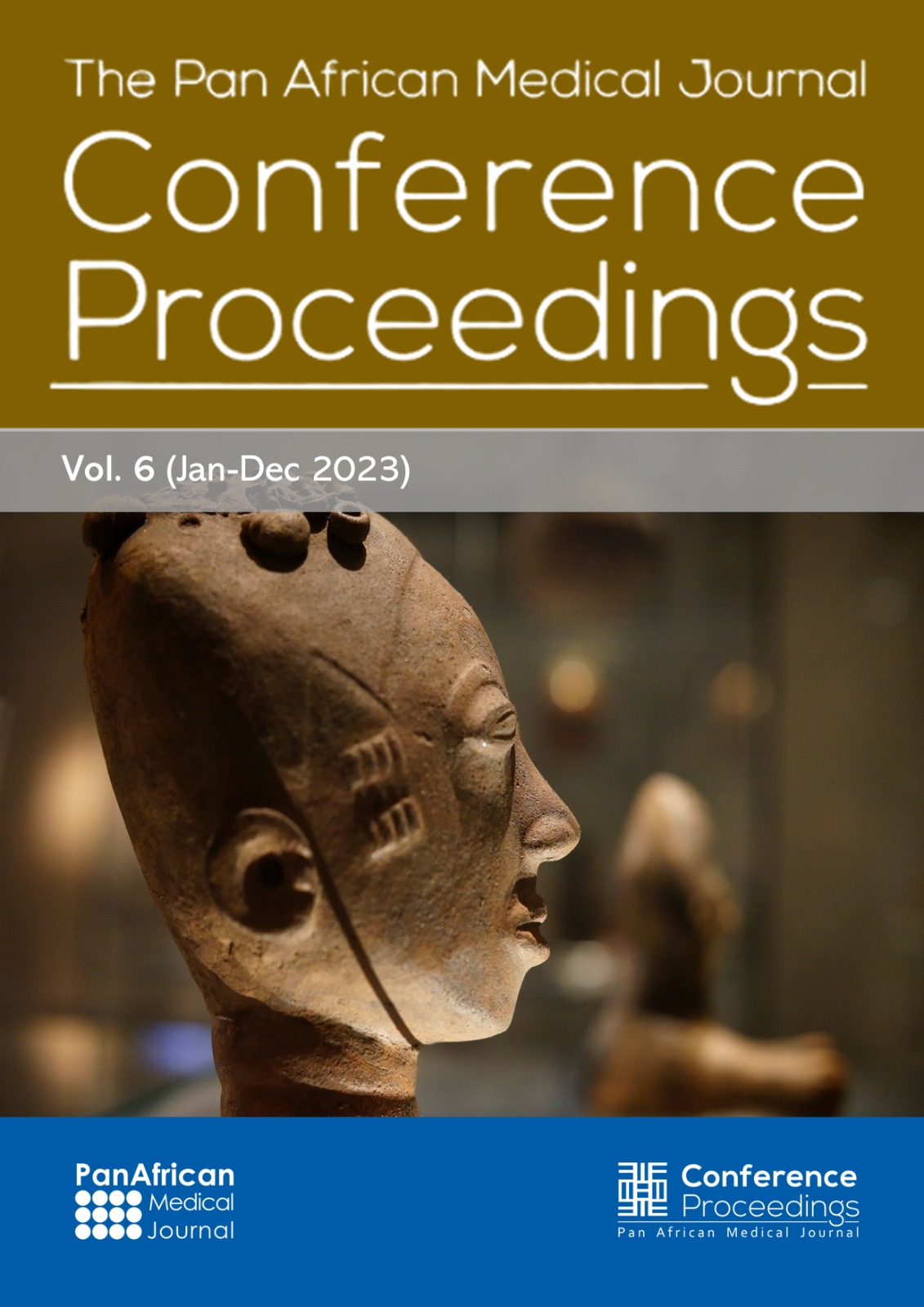Conference abstract
Genome analysis of methicillin-resistant Staphylococcus aureus isolated from pigs: Detection of the clonal lineage ST398 in Cameroon and South Africa
Pan African Medical Journal - Conference Proceedings. 2023:18(171).03
Oct 2023.
doi: 10.11604/pamj-cp.2023.18.171.2289
Archived on: 03 Oct 2023
Contact the corresponding author
Keywords: LA-MRSA, ABR, food safety, animals
Oral presentation
Genome analysis of methicillin-resistant Staphylococcus aureus isolated from pigs: Detection of the clonal lineage ST398 in Cameroon and South Africa
Luria Leslie Founou1,&, Raspail Carrel Founou Zangue1
1Research Institute of the Centre of Expertise and Biological Diagnostic of Cameroon, Cameroon
&Corresponding author
Introduction: Food animals are considered reservoirs of methicillin-resistant Staphylococcus aureus (MRSA) and are implicated in their zoonotic transmission in the farm-to-plate continuum. LA-MRSA has been reported as a zoonotic agent that has the potential to spread to humans and may cause infections in at-risk groups. Whole genome sequencing was used to describe the genetic environment and investigate the genetic lineages of MRSA isolates from pigs in Cameroon and South Africa.
Methods: during March–October 2016, 288 nasal and rectal pooled samples from 432 pigs as well as nasal and hand swabs from 82 humans were collected. Genomic DNA was sequenced using an Illumina MiSeq platform. Generated reads were de novo-assembled using the Qiagen CLC Genomics Workbench and SPAdes. The assembled contigs were annotated, and antibiotic resistance genes, virulence factors, plasmids, SCCmec, and phage elements were identified with ResFinder, Virulence Finder, PlasmidFinder, SCCmec Finder, and PHAST, respectively. Core genome single nucleotide analysis was undertaken to assess clonal relatedness among isolates.
Results: a lower MRSA prevalence was observed in pigs in Cameroon (n = 1/13; 0.07%) compared with South Africa (n = 4/22; 18.18%), and none of the workers were colonized by MRSA. Genome analysis identified various antibiotic-resistance genes along with six virulence factors in all isolates. All MRSA isolates belonged to the clonal lineage ST398 (spa-type t011) and harbored the type Vc SCCmec and several plasmids.
Conclusion: our study shows that the livestock-associated MRSA clonal lineage ST398 is already present in both Cameroon and South Africa and is probably underestimated in the absence of molecular epidemiological studies. It reveals the serious food safety and public health threat associated with this animal strain and underscores the need for interventions to contain this resistant clone.
Genome analysis of methicillin-resistant Staphylococcus aureus isolated from pigs: Detection of the clonal lineage ST398 in Cameroon and South Africa
Luria Leslie Founou1,&, Raspail Carrel Founou Zangue1
1Research Institute of the Centre of Expertise and Biological Diagnostic of Cameroon, Cameroon
&Corresponding author
Introduction: Food animals are considered reservoirs of methicillin-resistant Staphylococcus aureus (MRSA) and are implicated in their zoonotic transmission in the farm-to-plate continuum. LA-MRSA has been reported as a zoonotic agent that has the potential to spread to humans and may cause infections in at-risk groups. Whole genome sequencing was used to describe the genetic environment and investigate the genetic lineages of MRSA isolates from pigs in Cameroon and South Africa.
Methods: during March–October 2016, 288 nasal and rectal pooled samples from 432 pigs as well as nasal and hand swabs from 82 humans were collected. Genomic DNA was sequenced using an Illumina MiSeq platform. Generated reads were de novo-assembled using the Qiagen CLC Genomics Workbench and SPAdes. The assembled contigs were annotated, and antibiotic resistance genes, virulence factors, plasmids, SCCmec, and phage elements were identified with ResFinder, Virulence Finder, PlasmidFinder, SCCmec Finder, and PHAST, respectively. Core genome single nucleotide analysis was undertaken to assess clonal relatedness among isolates.
Results: a lower MRSA prevalence was observed in pigs in Cameroon (n = 1/13; 0.07%) compared with South Africa (n = 4/22; 18.18%), and none of the workers were colonized by MRSA. Genome analysis identified various antibiotic-resistance genes along with six virulence factors in all isolates. All MRSA isolates belonged to the clonal lineage ST398 (spa-type t011) and harbored the type Vc SCCmec and several plasmids.
Conclusion: our study shows that the livestock-associated MRSA clonal lineage ST398 is already present in both Cameroon and South Africa and is probably underestimated in the absence of molecular epidemiological studies. It reveals the serious food safety and public health threat associated with this animal strain and underscores the need for interventions to contain this resistant clone.








